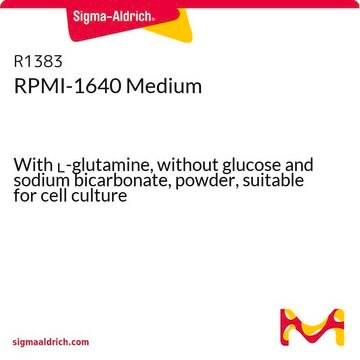R7509
RPMI-1640 Medium
With sodium bicarbonate, without ʟ-glutamine and phenol red, liquid, sterile-filtered,suitable for cell culture
Szinonimák:
Roswell Park Memorial Institute 1640 medium
About This Item
Javasolt termékek
product name
RPMI-1640 Medium, Modified, with sodium bicarbonate, without L-glutamine and phenol red, liquid, sterile-filtered, suitable for cell culture
Minőségi szint
sterilitás
sterile-filtered
form
liquid
technika/technikák
cell culture | mammalian: suitable
szennyeződések
endotoxin, tested
alkatrészek
phenol red: no
L-glutamine: no
HEPES: no
sodium pyruvate: no
NaHCO3: yes
kiszállítva
ambient
tárolási hőmérséklet
2-8°C
Looking for similar products? Látogasson el ide Útmutató a termékösszehasonlításhoz
Általános leírás
Alkalmazás
- to culture Mantle cell lymphoma cells
- to culture mouse podocytes
- in the extraction of whole bone marrow from rat Femur and tibia bones
Egyéb megjegyzések
Use this medium when working with stem cells or when growing cells at low densities.
Also recommended for in vitro diagnostics use.
gyakran vásárolják ezzel a termékkel együtt
Tárolási osztály kódja
12 - Non Combustible Liquids
WGK
WGK 1
Lobbanási pont (F)
Not applicable
Lobbanási pont (C)
Not applicable
Analitikai tanúsítványok (COA)
Analitikai tanúsítványok (COA) keresése a termék sarzs-/tételszámának megadásával. A sarzs- és tételszámok a termék címkéjén találhatók, a „Lot” vagy „Batch” szavak után.
Már rendelkezik ezzel a termékkel?
Az Ön által nemrégiben megvásárolt termékekre vonatkozó dokumentumokat a Dokumentumtárban találja.
Az ügyfelek ezeket is megtekintették
Tudóscsoportunk valamennyi kutatási területen rendelkezik tapasztalattal, beleértve az élettudományt, az anyagtudományt, a kémiai szintézist, a kromatográfiát, az analitikát és még sok más területet.
Lépjen kapcsolatba a szaktanácsadással





